#worldbuilding religion
Explore tagged Tumblr posts
Text
Imagine if in the future there was a culture that viewed nuclear explosions and power as the ultimate sign of divinity. Like, that was the most powerful earthly expression of God/a god/the gods in their religion.
Entire fields of barren land turned into basically open air temples that are constantly nuked during worship as a way of honering their gods mabye sacrifices would be put within the blast radius to give them fully to the gods. Thousands watching from a safe distance in prayer.
Some temples might be filled with eradication to the point where worshippers have to wear hazmat suits to even be there, and in a way it keeps them at a safe distance from the divine. Perhaps the oldest and most honered priests enter sections of the temple nobody else can, because they're finally old enough so that they'll die before the cancer from the radiation has time to set in.
Mabye nuclear war would be their ultimate taboo. Using the power of heaven to wage war on earth. And the warnings of mutually assured destruction have shifted into warnings of divine punishment.
Mabye they see the ancients as foolish for fearing nuclear power. This is a place of honer, great deeds are esteemed here.
#196#my thougts#worldbuilding#urban fantasy#writing#my worldbuilding#my writing#nuclear war#nuclear weapons#nuclear#nuclear power#religion#worldbuilding religion#scifi writing#scifi worldbuilding#science fiction#science fiction writing#furture#far future#post apocalypse#post apocalyptic
205 notes
·
View notes
Text
According to my scant, second hand knowledge of the Jewish religion (idek the proper name, don't @ me), Catholicism, and Christianity, back when Jews were nomads, way before they settled down in one place, their god Yahweh was, in two words, a vicious dickhead of a storm god, and only after they settled down in Canaan did they try to calm him down by doing the theological equivalent of murdering the real wise and kind skydaddy god, El, blessed be his name, and then have Yahweh wear his flayed skin like some sort of grotesque mask and eat the rest, and that frankly goes pretty hard. Anyways I'm SOOO co-opting that into my writing, imagine worshipping the god that killed the supreme skydaddy and ate his corpse to gain his might. That's baller.
Edit: After further study, I have concluded that Yahweh was once an aspect of Qos, a mountain, weather and war god of the Edomite people. The ancient Israelites of Canaan then did a systematic eradication of every other god in the greater Canaan religion, including such gods as El and Asherah, Yam and Lotan, Arsu and Azizos, Aglibol, Malakbel, Yahribol, Bel, and Ba'al Hadad. In their shame after the crushing of the ancient Jewish kingdom under Babylon, the Jews, jealous in the banning of sacrifices to Yahweh, later wrote into their own Bible the banning of sacrifices to all gods. But Yahweh took sacrifices, and Yahweh took sacrifices in human infants, for Yahweh was a fellow Canaanite god just like the rest of them.
Edit 2: THIS POST IS ABOUT THE PRE-JUDAISM YAHWIST CULT OF THE ANCIENT CITY STATE OF ISRAEL AND HOW IT BECAME THE MODERN CULTS. Having to add this because some fucking [REDACTED] in the comments think that literal historical facts (with added hyperbole) is antisemitic somehow. They know who they are.
#worldbuilding#gods#worldbuilding religion#truth is stranger than fiction#but fr tho the ancient canaanites were nomadic raiders#and bandits too#and their god were similarly violent#only after they settled down did they try to smooth things out#the draft was made before oct 7#in the spirit of keeping it straight i won't comment on the newer news here#jewblr#jumblr
77 notes
·
View notes
Note
Do you have any advice for worldbuilding religions? I have an idea of what i want practice of a certain facet to look like, but beyond that I'm stuck
Yes!
A few major things to always think about when worldbuilding religion
Size of religion
Cultural influence
Rituals/Festivities
The first thing I try to decide is what tone am I gunning for, and what do I want religion to do/represent in my worldbuilding. I work from there. It decides how extensively I want to work on and plan.
Pantheons & Gods
Decide if the religion is Monotheistic or Polytheistic, and balance your pantheons
(Also note that monotheistic religions often times technically still have pantheons due to how the religions formed over time, take for instance Christianity, with its saints, prophets, god, great angels, and demons)
For polytheistic religions try to create a general idea of what role each god plays in the lives of its followers. A common thing people forget about, and a thing that plagued me with two years of plothole filling, is how do the believers use an overall pantheon.
Are believers separated into groups who worship a particular god, but also acknowledge the others?
Are believers set to primarily worship one god out of a pantheon, the others being sidelined in their beliefs?
Are believers worshipping the majority of the pantheon, perhaps viewing a handful as powerful necessary evils?
Are believers equally worshipping the entirety of the pantheon?
Festivities & Culture
If holidays aren't originating from historical events, they often derive from religion, mythology, and folklore. Big influential religions become intertwined with culture, whether people like it or not.
This could be Christmas going from various Pagan religion's celebration of the winter solstice to a Christian holiday celebrating Jesus' birthday to a national tradition of gift giving many celebrate despite not being Christian. Every country sees culture influenced by religion in one way or another.
Other examples IRL
Religious clothing & accessories: Hijab, fez, kapp, modest dressing, clergy robes, cross necklaces, etc.
Calendar & work day: Working the majority of the week except for Sunday, national holidays, length of the month, start of harvest, etc.
Laws & society standards: Isms, Anti-Cannibalism, cleanliness culture, food consumption rules, etc.
Rituals
Rituals are also a major thing people think of when going to worldbuild a religion. This is the praying, the blessing food at the table, the enchanting a knight's sword with holiness before they charge into battle, the sacrifice into a volcano, the donating entire sheeps to a god's altar...
Rituals in worldbuilding are what can help differentiate and make the worldbuilding unique! Game of Thrones, Six of Crows, and Metro are all popular series that utilize religion heavily in their hard worldbuilding. In soft worldbuilding we also see a lot of unique religion; Hollow Knight, Spirited Away, and Dark Souls.
Ruling out the rituals and their important to the worldbuilding can do wonders to making a religion feel more real for the world it is in
Conflict
Sadly with religion usually comes conflict. This includes Isms (racism, sexism, religion vs. religion). Either way religion can play a greater role in military, government, conflicts, and more.
Take for instance warrior religion culture! Whether it be the Norse Vikings of Europe, the Pagan Roman Soldiers of the early Roman Empire, the Christian Crusaders and the blood trail they left behind, or even deities of war seen all over the world throughout history
(Im a sucker for war gods in worldbuilding)
Religion can be conflict, and for us worldbuilders, conflict can be very fun to play with!
IRL Controversy
A growing difficulty with worldbuilding religion is what I call mimicry, religion bad, and censoring
Mimicry
It's easiest and often even advised to pull from what we know when creating anything. However there's a point where we're not jumping off the deep end enough, and sometimes unintentionally we just end up making a slightly altered copy of an already existing religion. This can not only be offensive to the religion or it's people, but also limiting to the worldbuilder's potential.
There are always moments where this can be intentional in worldbuilding, especially for Alternate History and futurism worlds that are just an extension of what we know. But if its not what you're going for its a major thing to try to avoid.
Religion Bad
For many people extremism has ruined religion, and this can bleed into their work positively and negatively. That's when we run into religion bad! Where every single time religion appears, it is only there to be an evil, a badness, a stain. (This an awful way to think about religion in general, including in worldbuilding) This can cause people to skip over cultural worldbuilding, as well as limit them by forcing them to never indulge in any potential goods religion can cause.
Censoring
Now taking the previous two in mind, don't hinder yourself! Modern day Puritan Culture and Cancel Culture makes this last part hard to stop yourself. Self censoring is becoming more and more common for creators of all types, including worldbuilders. If you want to something guttural and grim dark do it! If you want to do something gory and cult-like, do it! If you want to do something whimsical and Ghibli, do it!
#worldbuilding#redd answers#dezert answers#worldbuilding religion#writing religion#world building#world building religion
63 notes
·
View notes
Text
@ folks who have made up a religion for their stories - please tell me about it. How deep into the lore do you go? Are there denominations? Is it a big part of the story? If they're inspired by real life religions, how do you keep them from being too similar (this is my biggest issue)?
3 notes
·
View notes
Text
Now, I don't plan on really writing it but I am amused by an idea for an alternate history setting in which some branch of broadly defined gnosticism (probably one with no ban on reproduction akin to Mandaeism) becomes the mainstream of christianity and world's most popular religion. It would be a delight to have a shallow/"orientalist" depiction of more "standard" christians by members of this faith. Something along the lines of:
"World's oldest doomsday cult, widely known for obsession with displayed bones of their martyrs, they worship the foul demiurge conflating him with the Most High Monad. Their most venerated figure analogous to John the Baptist, Greatest of Prophets is the born fatherless abomination Yeshua the Nazarene alongside his witch mother. Despite the common belief the cannibalism in their rituals is purely symbolic."
You get my vision? And then the POV characters can encounter those non-gnostic christians and be like: actually, they're not that bad, weird maybe but no worse than us.
2 notes
·
View notes
Note
🌍 - What are this oc’s religious views?
(in response to this ask game)
The Wheel chose Draven Cozenson from The Hunter, the Myth and the Cure for this one!
Fantasy religions for me are either all or nothing; I either have a whole lot of details or I don't even remember to address it. Lucky for us Valaria worldbuilding has a bit of the former! (not as much as Trials of the Six, but definitely more than Forsaken)
In the oc interviews and similar tag/ask games I've done in the past, you've probably noticed that Draven mentions celestials a lot, or something called the depths. (Minor worldbuilding tangent: Celestials are the Valarian equivalent of angels, and the depths is the Valarian name for hell.) He doesn't really believe either exists, but he swears by them anyway. I suppose that makes him an atheist.
#thanks for the ask!#oc ask game#ask game#my ocs#draven cozenson#fantasy religion#worldbuilding#worldbuilding religion#tales from valaria#thtmatc
4 notes
·
View notes
Text



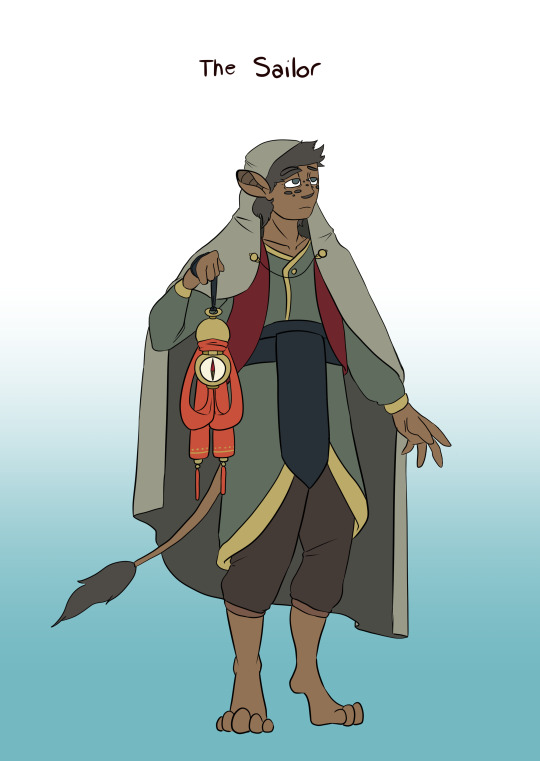
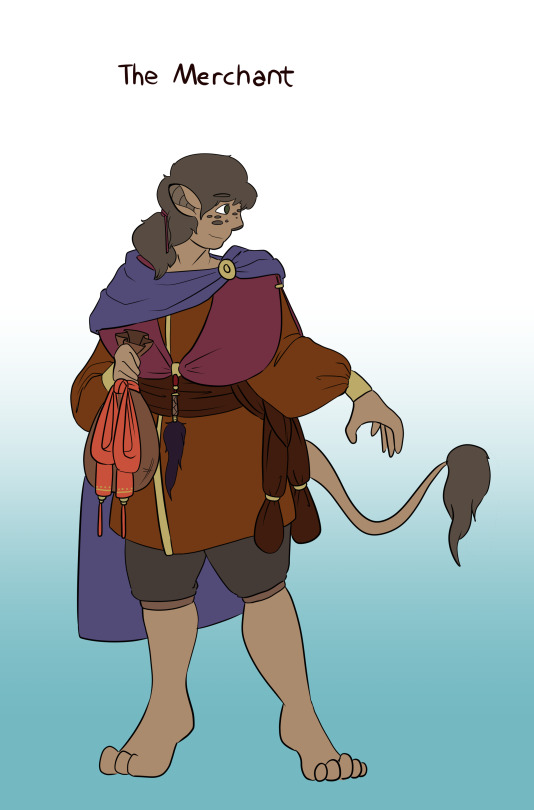
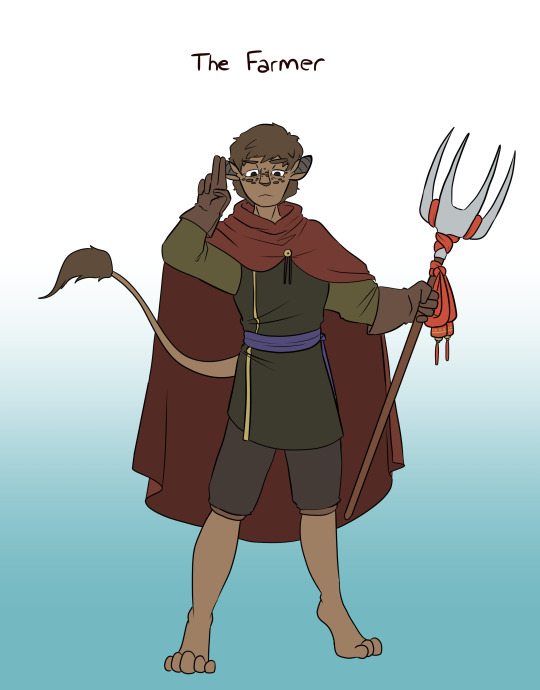
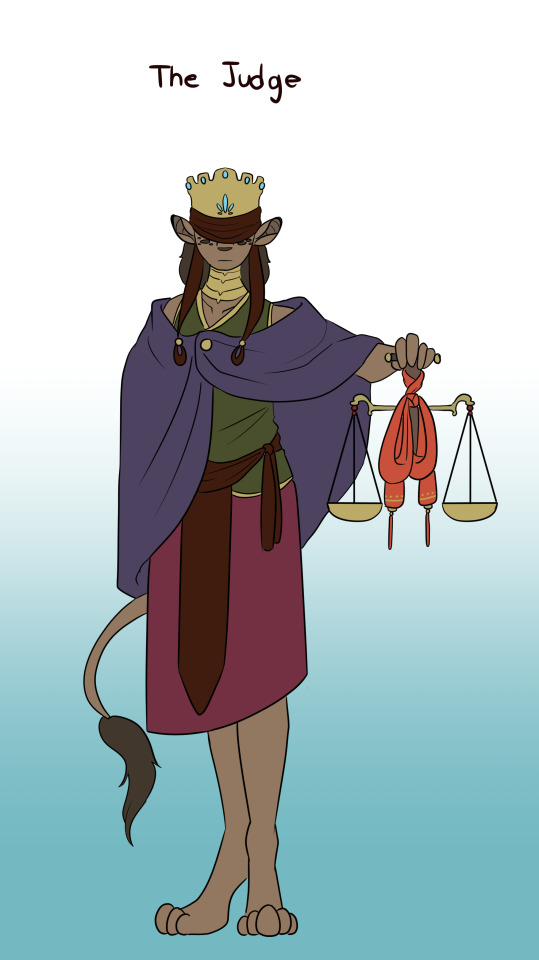
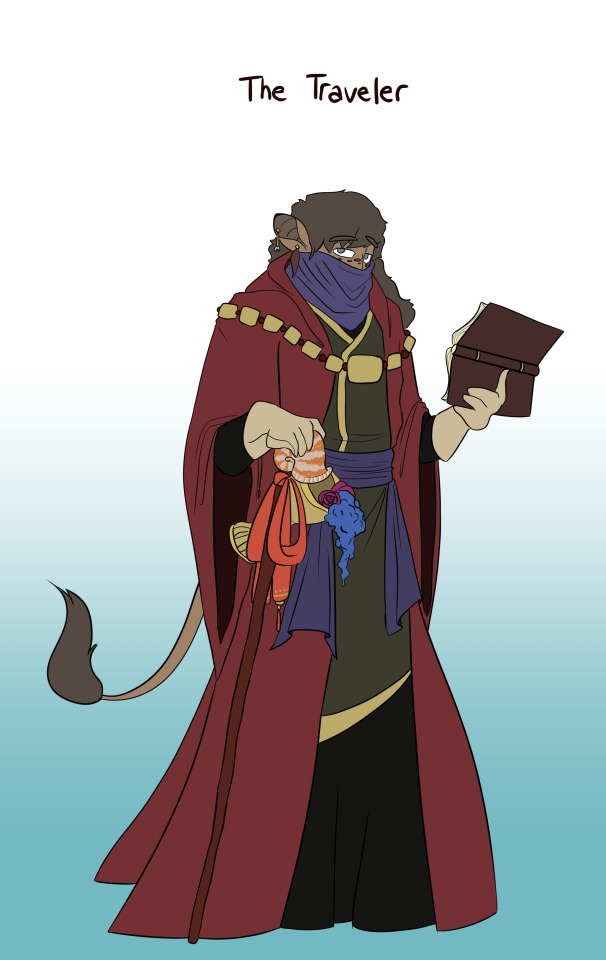
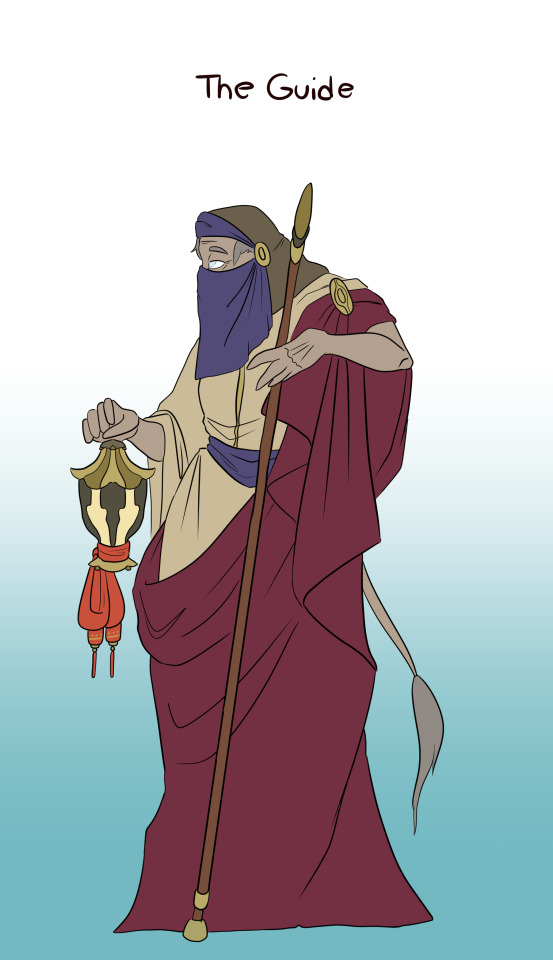
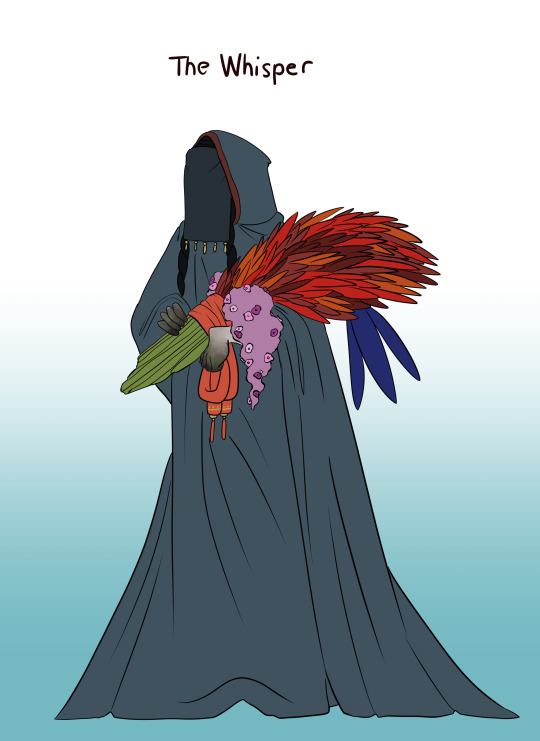

Behold, the primary religion of the United Islands! Lore under the cut!
Lore:
Behold, the great Ten Faced God! Or the Pantheon of Ten, if you subscribe to that belief.
Because, as is with history, the nature of the divine is a contentious subject in the United Islands. There are three main camps of thought:
The Ten Faced God asserts that there is one god, and that god changes forms throughout the year. They are one entity, although each form is not the same as each other. This is the newest interpretation, the currently dominant school of thought, and is practiced in most urban areas of the mainland and on the larger islands.
The Pantheon of Ten asserts that there are 10 different gods, with their own domains, who rise and fall in power throughout the year. They have relationships and a family tree (comment if you want to know more). This is the older of the two more common forms, and is practiced on the smaller islands to the south, and in some rural sections of the mainland.
The 10 Realms asserts that the gods are not entities at all, but a collection of spirits that serve under one of 10 divine domains people thing of as gods. This is the oldest form of the religion, only practiced anymore way out in the desert and in remote mountain villages, in small cults dedicated to specific spirits.
What all of these schools of thoughts agree on are the names and orders of the gods and their domains. In order there is:
The Shepherd: Also known as the Maiden, Queen, or Mother, the Shepherd is the goddess of fertility, animals, spring, and the soul. She is also known as the divine symbol of womanhood, motherhood, and children. She represents the love shared between a parent and child, and will strike down those who would bring harm to children. In the polytheistic model, she is the queen of the pantheon. Her divine symbol is the Shepherd's Crook.
The Dancer: Also known as the Paramour, Drunkard, or Trickster, the Dancer is the god of the arts, sex, emotion, games, and celebration. He is also the divine symbol of mischief, romance, creativity, and tricksters. He represents the fiery, passionate love in young relationships, and protects and tends to love wherever it may grow. His divine symbol is a basket of party favors, including wine, grapes, and fruit.
The Guardian: Also known as the Soldier, Sculpture, and Watchman, the Guardian is the goddess of war, the body, fire, and summer. She is also known as the divine symbol of strength, protection, and the land itself. She represents the love between a person and their country, and literally shaped the land to protect the people, according to mythology. Her divine symbol is her spear.
The Sailor: Also known as the Fisherman, Captain, or Storm, the Sailor is the god of the oceans, the weather, instincts, and fish. He is also known as the divine symbol of determination, the tides and currents, and the unpredictability of the world. He represents the love between a person and their craft, and will bless those in need of the drive to finish the job. His divine symbol is a compass.
The Merchant: Also known as the Gambler, Craftsman, or Surf (very controversial), the Merchant is the goddess of wealth, trade, luck, and commerce. She is also known as the divine symbol of fortune (both good and bad), workers, the artisans. She represents a love in the sense of aesthetic appreciation or infatuation and tends to follow flights of fancy whenever it strikes her. Her divine symbol is a coin purse.
The Farmer: Also known as the Father, King, or Reaper, the Farmer is the god of fertility, agriculture, work ethic, and autumn. He is also known as the divine symbol of manhood, fatherhood, and marriage. He represents the older, mature love between long time committed partners, and will strike down those who would threaten their own family, particularly their partner. In the polytheistic model, he is the king of the pantheon. His symbol is a pitchfork.
The Judge: Also known as the Debt Collector, Politician, or Balancer, the Judge is the goddess of justice, conscience, shelter, and leadership. She is the divine symbol of politicians, the courts, leaders, and even criminals. She represents the love between a person and society, and watches those who may abuse such society, both the criminals and ones who prosecute them. Her divine symbol is a balancing scale.
The Traveler: Also known as the Wanderer, Stranger, or Vagabond, the Traveler is the god of roads, the mind, winter, and knowledge. He is the divine symbol of curiosity, scholars, travelers, and storytellers. He represents the love between a person and the world around them, and is known to compel people to wander away from home. His divine symbol is his walking cane.
The Guide: Also known as the Weeper, Ferryman, or Mourner, the Guide is the god of time, rivers, the moons, and medicine. They are the divine symbol of the aging, frost, and endings. They represent the brotherhood love between two friends, ones who would die for each other. They are the divine protector of the sick, dying, and those who mourn for them. They are described as neither man nor woman, but something in-between. Their divine symbol is their lantern.
The Whisper: Also known as the Mist, Silent, or Shrouded, the Whisper is the god of death, sleep, and cycles. They are the divine symbol of mist, dreams, and the dead, as well as the end of the year. They represent the compassionate love one must have for themselves, and only is said to act upon the world during the last two days (or three if it's a leap year) of the year, collecting those who have died and take them back to the garden from which they were made. They are described as completely genderless. Their divine symbol is the death bouquet.
#ask blog#ask box open#send me asks#worldbuilding#fantasy worldbuilding#digital art#my art#worldbuilding ask blog#worldbuilding religion#nonbinary character#agender character
8 notes
·
View notes
Text
One of my all time biggest pet peeves with historical(ish) fantasy is when the writer constructs a religion with a clear bias that it's stupid and false and therefore only the Stupid People and/or commoners believe in it and all the smart/elite main characters are like, quasi-atheists or otherwise just routinely flout established religious conventions of orthodoxy and/or orthopraxy because they're Too Smart for it or etc.
It's usually an extension of assumptions that people in the past were just less intelligent than in the contemporary, just being like "I know that the sun is a star millions of miles away that the earth orbits, but this ancient religion describes it as a chariot flying through the sky" and not really bothering to learn the context and just (consciously or subconsciously) settling on 'that's a crazy thing to think and was probably believed in because they were Stupid'.
And that whole attitude pisses me off so much. People were as 'smart' 10,000 years ago as they are today. These beliefs aren't just desperate, random flailing to explain phenomena that could not directly be accounted for either, it's not like people just looked at the sun and went "Uhhh I don't know what the fuck that thing is, actually. I guess it might be a chariot or a boat or something?? Yeah let's go with that." and based entire religious practices on this. Every well-established belief system exists within broader contexts of cultural values/subjective perceptions of reality/knowledge systems/etc, and exist as part of a historical continuum of religious practices that came before. Even when not Materially Correct, they have context and internal logic, they're not always dead literal with zero levels of allegory, and they're never a result of stupidity.
#I think you're failing at good worldbuilding and also just like. Idk failing at being an understanding human being willing to learn about#people different from yourself when you approach writing religion from a 'uhhhh what's some random stupid shit people believed in#2000 years ago' angle#Like make an effort to understand the logic and worldviews and value systems that informed these practices before you synthesize your own
9K notes
·
View notes
Text
Level 1: Characters in a fantastical setting with no clear analogue of any real-world culture or religion celebrate Christmas; the implications of this are never examined
Level 2: Characters in a fantastical setting celebrate a secular, non-denominational mid-winter holiday which just coincidentally involves many of the same rituals and observances as Christmas
Level 3: Characters in a fantastical setting celebrate a mid-winter holiday commemorating an invented folk-hero whose mythos furnishes elaborate alternative explanations for various Christmas observances
Level 4: Characters in a fantastical setting celebrate Christmas because in spite of the setting's history otherwise bearing no resemblance to that of Earth, for some reason Catholicism still exists
Level 5: Whatever C S Lewis was on
10K notes
·
View notes
Text
I am including her in my worldbuilding for my steampunk world now. As one of the angels/ascended saints/young gods. Her name is Aerta. And she’s a 8ft tall transfemme butch with solid red eyes and the power to manipulate rust. I will draw her.
Random idea. Transfem Ares.
Like the Greek god.
That’s it. I think she’d be cool.
#trans girl#transfem#ares deity#ares#ares greek mythology#ancient greek mythology#reinterpretation#worldbuilding#new oc#worldbuilding religion#creating a god
15 notes
·
View notes
Text
An annoying part about any fandom discourse is the push to categorize characters, populations, and factions as representations of actual groups IRL. The most annoying one (to me) is insistence that a particular group is Indigenous Peoples and the other is the White Settlers.
Like a lot of people in the U.S., I'm mixed race. Many who are mixed race don't identify as such; they pick one or another. Why? Because mixed race identities are systematically ignored or erased on multiple levels of government and political influence: census records, diversity reports, financial aid qualifications, membership in political groups, etc. Choosing one identity alone is rewarded with greater voice and resources in different spheres. Acknowledging that this split isn't real is offensive to groups in power, both for the dominant hegemony of Whites and the coalitions of minority groups. Each group benefits from enforcing this exclusionary practice because it allows specific people to justify their leadership based solely on their heritage: a new aristocracy.
All this fake dichotomy nonsense in fandom is a replication of that mentality. Like, some media like The Terror really, truly are commentary on colonialism. There's no need to hide the ball about it. If your favorite media has nothing to do with conquest, exploitation of land and resources, or the subjugation of populations for the benefit of foreign powers, then it's not about colonialism. There's other themes to explore.
#critical role#you have no idea how many times I've been told I'm not Mexican enough to be Mexican#not chicana enough#not latina enough#guess what it's never been white people who say that#at least white supremacists just say I'm not White and I don't mind because they're right I don't get to claim a privilege I never had#maybe stop furthering this idea that mixed race people don't exist#that'd be great#that'd be a lovely world to live in#where I don't have to choose White or Other to count as a person or to speak to my experience#anyway yeah this is about critical role because mortals were created by gods and Primordials so they aren't native#the closest possible analogy for mortals is they're mixed race#and don't belong anywhere as 'Indigenous' because that's not how this works#it is completely incompatible with this worldbuilding#also killing 4 primordials is not genocide they're elemental entities on the scale of gods and that word simply doesn't work in that contex#maybe come at the story with the lens of religion and philosophy in which it was presented#instead of making up racial themes that aren't in the source material
162 notes
·
View notes
Text
Worldbuild Differently: Unthink Religion

This week I want to talk a bit about one thing I see in both fantasy and scifi worldbuilding: Certain things about our world that we live in right now are assumed to be natural, and hence just adapted in the fantasy world. With just one tiny problem: They are not natural, and there were more than enough societies historically that avoided those pitfalls.
Tell me, if you have heard this one before: You have this fantasy world with so many differnet gods that are venerated. So what do you do to venerate those gods? Easy! You go into those big temple structures with the stained glass in their windows, that for some reason also use incense in their rituals. DUH!
Or: Please, writers, please just think one moment on why the fuck you always just want to write Christianity. Because literally no other religion than Christianity has buildings like that! And that has to do a lot with medieval and early post-medieval culture. I am not even asking you to look into very distant cultures. Just... Look of mosques and synagogues differ from churches. And then maybe look at Roman and Greek temples. That is all I am asking.
Let's make one thing clear: No matter what kind of world you are building, there is gonna be religion. It does not matter if you are writing medieval fantasy, stoneage fantasy, or some sort of science fiction. I know that a lot of atheists hate the idea that a scifi world has religion, but... Look, human brains are wired to believe in the paranormal. That is simply how we are. And even those atheists, that believe themselves super rational, do believe in some weird stuff that is about as scientific as any religions. (Evolutionary Psychology would be such an example.)
What the people will believe in will differ from their circumstance and the world they life in, but there is gonna be religion of some sort. Because we do need some higher power to blame, we need the rituals of it, and we need the community aspect of it.
Ironically I personally am still very much convinced that IRL even in a world like the Forgotten Realms, people would still make up new gods they would pray to, even with a whole pantheon of very, very real gods that exist. (Which is really sad, that this gets so rarely explored.)
However, how this worship looks like is very different. Yes, the Abrahamitic religions in general do at least have in common that they semi-regularily meet in some sort of big building to pray to their god together. Though how much the people are expected to go into that temple to pray is actually quite different between those religions and the subgroups of those religions.
Other religions do not have this though. Some do not have those really big buildings, and often enough only a select few are even allowed into the big buildings - or those might only be accessible during some holidays.
Instead a lot of polytheistic religions make a big deal of having smaller shrines dedicated to some of the gods. Often folks will have their own little shrine at home where they will pray daily. Alternatively there are some religions where there might be a tiny shrine outside that people will go to to pray to.
Funnily enough that is also something I have realized Americans often don't quite get: Yeah, this was a thing in Christianity, too. In Europe you will still find those tiny shrines to certain saints (because technically speaking Christianity still works as a polytheistic religion, only that we have only one god, but a lot of saints that take over the portfolios of the polytheistic gods). I am disabled, and even in the area I can reach on foot I know of two hidden shrines. One of them is to Mary, and one... I am honestly not sure, as the masonry is too withered to say who was venerated there. Usually those shrines are bieng kept in a somewhat okay condition by old people, but yeah...
Of course, while with historically inspired fantasy settings make this easy (even though people still hate their research), things get a bit harder with science fiction.
Again, the atheist idea is often: "When we develop further scientifically, we will no longer need religion!" But I am sorry, folks. This is not how the human brain works. We see weird coincidences and will go: "What paranormal power was responsible for it?" We can now talk about why the human brain has developed this way. We are evolved to find patterns, and we are evolved (because social animal and such) to try and understand the will others have - so far that we will read will in nature. It is simply how our brains work.
So, what will scifi cultures believe in? I don't know. Depends on your worldbuilding. Maybe they believe in the ghost in the machine, maybe there si some other religions there. You can actually go very wild with it. But you need to unthink the normativity of Christianity to do that. And that is... what I see too little off.
#worldbuilding#fantasy worldbuilding#science fiction#scifi worldbuilding#religion#fantasy religion#forgotten realms#dungeons & dragons#dnd#writing#fantasy writer
327 notes
·
View notes
Text

Septon Meribald’s statement here strikes me as getting at something intrinsic to the essence of sacrifice in ASOIAF. A sacrifice's power comes from its voluntary nature. Seems like an important point in a world where so many religions practice human sacrifice.
249 notes
·
View notes
Text
Video Essay Wednesday:
youtube
#writing#worldbuilding#video essay#video essays#curious archive#worldbuilding gods#worldbuilding religion#Youtube
4 notes
·
View notes
Text

Where the bowels of the earth meets the sky, they dance.
#the hobbit#my art#tolkien#lotr#dwarves#the lord of the rings#lord of the rings#tolkien dwarves#dwarf culture#dwarf culture headcanons#dwarf dancing#Ironfists#Ironfist dwarves#though you cant see much of them#dwarf religion#dwarf religion headcanons#mr.kida verse#my worldbuilding
233 notes
·
View notes
Text
The Problem of Religion in Harry Potter (or, what is Wizard God?)
tl; dr: I wish more hp fics did something with religion and the wizarding world
so to state my credentials up front: I've read a lot of hp fanfiction, a little on the Reformation and religious history--like, I have probably more background knowledge than the average person but I am very emphatically not an expert and have never actually taken a class specifically on any kind of religious history, and I'm an ex-Catholic who did ten ish years of religion classes. There are probably a LOT more people more qualified to talk about this than me but whatever I've never actually seen very much meta written out on this specific issue so I'm giving it a try. (if you have written or read such meta, please send me recs)
ahh the Problem of Religion one of the great unsolved mysteries of the hp world building (similar issues include What the Fuck is Going on with Ireland, How Does the Ministry Actually Work, What is the Population, etc) and I call it 'unsolved' because the fandom has no massively popular solution (like Lordships for the Problem of the Wizengamot) and in general tends to just not think about it, much like JKR originally did. Now IMO she probably intended most wizards to be, like, generically Church of England or whatever without much investment--basically copying the Muggle equivalent whenever it isn't spelled out how the two worlds differ, which is I think a lot of her un-filled-out world building is meant to be. Which. OK. You can do that, but, you know, religion is a very very important aspect of worldbuilding and in my opinion ignoring it and expecting it to be just the same as 1990s Muggle Britain is uninteresting and lazy.
This (wizards are meant to be some kind of Christian and probably Church of England just for simplicity's sake) is evidenced by things like Hogwarts having Christmas and Easter breaks, James and Lily having a Bible quote picked out by Dumbledore on their tombstone, and Draco Malfoy, most emblematically wizard of wizard characters who can be taken as a potential baseline, automatically saying things like 'Good God'. Which, you know, implies that the idea of a single God, and probably the Judaeo-Christian God because that's the same cultural background as the rest of Britain, is taken for granted by wizarding society. It doesn't necessarily imply anything about Draco's or even the Malfoys' personal beliefs, and of course you have other characters saying things like 'Oh my Merlin' and "Morgana" and things like that. Which in my opinion wasn't meant to be indications of some kind of Merlin or Morgana worship but more quirky and fun flavor things of the kind jkr loves to include without thinking out the implications. But you absolutely can take those statements that way--this post is absolutely not meant to dictate how people want to headcanon and I am absolutely here for giving wizards a well thought out pagan or Non-Christian religion, I just don't think that was the author's intent. There's also plenty of other things that imply Wizarding cultural Christianity that I'm not remembering off the top of my head.
And, of course, much better writers than me have extensively discussed all the Christian themes in HP. Of course, themes don't need to affect how people worldbuild in fanfic.
So: with HP canon, we are looking at a society that is probably culturally Christian and probably (key word) intended to be Church of England. But, because JKR wasn't putting much thought into it and basically just took a Chrisitian bedrock of society for granted, the implications of this are not really explored at all. So what I'm interested in is how fandom deals with it.
Mostly, that is...not at all, either taking cultural Christianity in the Wizarding World for granted the way JKR does or by ind of handwaving that wizards have evolved beyond the need for religion and that's just how it is. And that's perfectly fine! Not everyone wants to come up with a full, working, wizard society, and even if they are trying to worldbuild some aspects of wizarding society religion is often ignored, because people don't want to deal with it for often valid reasons (religious trauma, just disinterest, grew up agnostic, not Christian but thinks wizards probably are etc, etc, etc, ) Personally I wish more fics delved into what wizarding religious belief actually is, but to put it bluntly, that's just me. And I have never dealt with religion in my own fics. So don't takethis as judgement at all.
But there are interesting headcanons when people do choose to try and worldbuild religion in HP.
Fom what I've seen, one of the major ways to deal with religion in HP (aside from not dealing with it at all) is to give wizards, often pureblood wizards, some kind of pagan, often Celtic-inspired, religion. And this is quite defensible! Sometimes this is badly executed and/or turned into Death Eater apologia, but the idea of wizards having a different religion is really interesting and a good deal more interesting (IMO of course) than just not mentioning religion at all. Most fics that I've seen don't delve too deeply into, like the actual history and theology of these religions, but there are definitely some that do. (Also if you know any PLEASE send me recs). So if handled well, this is a great way to add some religion worldbuilding in the world of Harry Potter.
However, my personal favorite set of possibilities--obviously I have some personal bias as a history nerd with a long standing if never as deeply researched as I would like to interest in the history of Christianity and as an ex-Catholic--is that, well, we know the statute of secrecy started..when, exactly? 1690. So this much is obviously a result of JKR's Hollywood understanding of witch hunts (a subject for another time and someone far more qualified). For interested wrodlbuilders, we can take this as a guideline at best, as personally I think it would have taken a good deal longer than one year to agree on and implement something like the Statute and I tend to take 1690 as an end date, not a start. I also tend to take the Statue as a largely European phenomenon, at least at first. But, uh, what was happening in Britain at the time..oh, right...the Glorious Revolution....what was happening that created the conditions for the Glorious Revolution...oh, the English Civil War...which was because of...oh yeah, and what was also happening on the continent, maybe it involved, wait, thirty years..oooh, the Thirty Years War...wait weren't there a whole bunch of massive social shifts happening in Europe at this point in time isn't that funny but surely the stature of secrecy could be considered a part of these massive social shifts...all of which was heavily influenced by...you guessed it, the Protestant Reformation.
Wait. So. Maybe, the separation of Wizards from Muggles, at least in Britain, wasn't actually about Muggles hating wizards or wizards hating Muggles. Maybe it was about religion. Now personally I find this ABSOLUTELY FASCINATING. The possibilities, the possibilities...
Wizards had a massive religious civil war that created the blood status system in its modern form? Particular families have wildly different denominations? Excellent. Religion both in terms of level of religiosity and in terms of denomination is a blood status marker? Excellent. Purebloods are all Catholic (what does this do to both Catholic and not Muggleborns?) Excellent. Purebloods are all Puritans? Weird, but if you can pull it off excellent. Purebloods are all one of the wacky new denominations that sprung up after the Reformation and then either died out or conquered the world? Excellent. Pure bloods are all Lutherans who really hated Henry VIII? Excellent. One of my favoirite ways to create a wizarding religion was someone who had most pure bloods follow a denomination that split off from Catholicism in the Great Schism and then a small minority being Catholic, with the worlds splitting around the Reformation. Even the paganism headcanons can be incorporated: the Reformation could conceivably have made it much more difficult to keep practicing wizard paganism causing separation of the worlds.
Personally I would love to see a world that used the history of the Protestant Reformation super well, but it's not the only way to relate a Wizarding religion or a Wizarding religious history. I just wish more people tried to do that at all. Let wizards be religious! Or let them be irreligious but have thought about it, instead of just ignoring religion at all as something that might conceivably have influenced human societies. Maybe Wizarding Britain has state sponsored atheism. Just say that outright!
Another thing I'd like to see more fic doing is theology: how does having magic impact people's religious doctrine? Does every major religion essentially have a wizarding branch with its own theology because magic impacts their view of the world so much, or do most wizards simply follow the majority Muggle religion in their country with no modifications? if so, why? Do some wizards disagree, potentially violently, over how to incorporate magic into their religion? Do some people refuse to use magic because they think it goes against their religion? Etc etc etc you could go on forever. I've seen fic, which randomly enough was about Regulus Black, do this pretty well (or I thought so as a non-Jew) for Judaism, and I'd love it if done with other religions.
Anyway. Now I have to figure out how the hell religion works in the Wizarding Britain of my own headcanon.
#meta#my meta#harry potter#hp#my hp meta#hp meta#religion in hp#hp worldbuilding#hp world#my worldbuilding#headcanon#the Protestant reformation#hp and history#jkr critical#worldbuilding#fanfic advice#hp fanfic#hp fandom#hp fanfic advice
91 notes
·
View notes